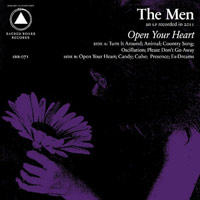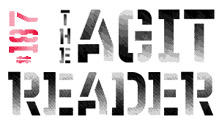
Open Your Heart
Sacred Bones
With their debut, last year’s Leave Home, The Men created a cacophonous masterpiece that successfully crossed the wires of hardboiled punk and psychedelic drone. Each song on that record coursed with white heat, whether tapping Spacemen 3’s lysergic bloodline or coming on like the heir apparrent to Amphetamine Reptile’s nasty brood. As such, it’s hard not to feel a little shortchanged upon first hearing the band’s follow-up, Open Your Heart, which eschewing some of the pigfucked aesthetics of its predecessor, seems tame by comparison.
But spending more time with Open Your Heart, one quickly realizes that the band hasn’t lost one ounce of its tenacity. By trimming the dissonance, The Men have simply shortened the distance to sonic epiphany. Channeling Stiff Little Fingers, the leadoff track, “Turn It Around,” is rock reduced to its essential elements: a fierce riff, a lyrical hook, and hard-as-nails beats taking the whole thing off into the sunset. In other words, The Men aren’t messing around. “Animal,” which follows, is (unsurprisingly) fierce, at once rabid and underpinned by melodic refrains. That the band still doesn’t shy away from stretching out into the abyss elsewhere (“Oscillation,” “Presence”) further elucidates their intentions to be to take the record as far it can go. I strongly advise that you follow.
Stephen Slaybaugh

Start the Revolution Without Me
B-Unique/Cooperative/Downtown
Britain’s Kaiser Chiefs have followed a well-worn path here in America. After “I Predict A Riot,” from their 2005 debut, Employment, earned their place on indie-dance playlists and “Oh My God,” memorably covered by Lily Allen and Mark Ronson, also made some noise, they seemed to drop off the face of the Earth, at least here in the States, where they were seen as one-hit wonders. So the fact the band’s been silent for three years probably didn’t register. However, when they came back last year, they came back in a big way. The Future Is Medieval is probably the first ever crowd-sourced album. The band launched a website with about 20 songs where listeners could construct their own version of the album or download a version previously compiled. The band eventually released their official version, but declined to do so in the US, instead choosing to reconfigure the album into a brand new release, Start the Revolution Without Me.
It seems the band was deeply inspired by its mixtape experiment, but at the end of the day, the ultimate question is if the record stands on its own. The answer is emphatically “yes.” For those who haven’t tuned in since Employment, many of the tracks contain the same giddy energy of that record’s best cuts, though things go a bit wonky when the band dips into the indietronica pool by cranking up the drum machine or laying down a squiggly synth line. But they wisely sequenced those songs earlier and spend the core of the record back to basics. While there’s no obvious big single, Start the Revolution Without Me is a record full of strengths that should entice America to tune back in.
Dorian S. Ham

Ghostory
Vagrant
I’m waiting for someone to write a great essay about the internal struggle of man and machine as exemplified by early-00s bands who hold Depeche Mode, My Bloody Valentine and the Cocteau Twins close to their hearts. Ghostory, the third album from School of Seven Bells, will make a great centerpiece for that article. Whether it’s the relatively benign hi-hats and four-on-the-floor of “Lafaye” or the rather more sinister machinations of “Low Times,” the machines become increasingly present as the album goes on. Not that there hasn’t been plenty of artificial supplements in the band’s past work; their biggest hit, “Heart Is Strange,” exemplifies this fact, but even that song is mostly about melody. And especially in a live setting, the organic elements—shimmering guitars, waves of reverb, and layer upon layer of ethereal vocals—are the most memorable parts of the Seven Bells experience.
Earlier songs like “White Elephant Coat” and “Camarilla” are examples of how the band successfully blends digital and natural elements, sometimes even making a point of the clash. That’s how they’ve been able to resist sounding just like everybody else, despite wearing such common, even trendy, influences on their rolled-up sleeves. So it’s with a bit of disappointment that I have to report that the computers have won this time. Songs like “Scavenger” and “The Night” start out with potential, but after a couple of minutes you’ll be wondering if you haven’t heard them somewhere before, maybe even on a Cranberries record. On Ghostory, School of Seven Bells have let the machines undermine their work, dragging mediocre impulses into the limelight. They let their guard down, and the result is that they sound just a bit too much like everybody else.
Matt Slaybaugh
MP3: “The Night”

Songs for an Age of Extinction
Kiam
While Songs for an Age of Extinction may be Tim Foljahn’s first truly song-centered album, the record represents the latest entry in a long list of appearances from the New York–based guitarist. Perhaps best known for his work supporting artists such as Cat Power, Thurston Moore, Townes Van Zandt, Half Japanese and the Boredoms, Foljahn has also released a number of noteworthy recordings with Two Dollar Guitar, a band that also featured Sonic Youth’s Steve Shelley.
Though Foljahn is (justifiably) recognized for his guitar mastery, Songs makes the case that he’s a multi-faceted artist in his own right. The pleasantly surprising “All Fall Away” and “Faded” rely heavily upon Foljahn’s electric piano playing, and the instrument’s quiet tones are perfectly suited for these meditative ballads to loss and life’s hard realities. Foljahn throws another expectation-defying curveball with “Song for an Age of Extinction,” a track that is dominated not by guitars, but by sitars, which drone underneath Foljahn’s relaxed vocal. It’s essentially “Within You Without You” on downers. This isn’t to say that Foljahn’s completly neglected the guitar, as “God Song” features a sizzling electric lead that plays well over a slow groove centered around a smooth bassline and accented by the electric piano. The album’s finale, “The Dust of Exploded Stars” stands as its most interesting moment (and longest, clocking in at just over 10 minutes). It is, appropriately, a sparse instrumental track dominated by the electric piano and assorted white noise that perfectly captures a cool, expansive interstellar sound before eventually devolving into controlled synth explosions at the end.
Ron Wadlinger
MP3: “New Light”

Your’s Truly, Cellophane Nose
Mute
Beth Jeans Houghton does not take kindly to labels. In interview after interview, she has declared her distaste for the “folk” label. She proclaimed to The Guardian that her first EP was “not bloody folk,” despite repetitive comparisons to the genre. So for their first full-length album, Your’s Truly, Cellophane Nose, Houghton and her foursome collectively known as the Hooves of Destiny, have shed any blatant notions of folk in favor of a scrupulously arranged, genre-bending record.
From the first track, it’s clear that Houghton is not bound by any popular musical conventions. With its bursting drums and steadily climbing vocals, “Sweet Tooth Bird” sets the tone perfectly for the roughly 35 minutes of childlike wonder that follows. “Dodecahedron,” with its fanciful melody and charming “do’s” and “da’s,” is a masterful study in baroque frivolity. The sweeping, over-the-top chorus is the musical equivalent of a ribbon dance: unpredictable, yet completely under control. While Houghton, with her stunning soprano, certainly possesses the same fierce dynamic as other female singer-songwriters like Bat for Lashes’ Natasha Khan and Laura Marling, she veers largely into a category (or “un-category”) of her own, taking cues from a wide variety of genres ranging from showtunes to gospel to psychedelia. At times, however, the songs feel almost like performance art, namely on “Humble Digs.” With its constant crescendos that give way to rivers of gentle “oohs” and “ahhs,” the song is reminiscent of Baby Dee. While perhaps not quite as eccentric as Dee, there are hints of that token carefree approach to singing and song structure. Utilizing instruments ranging from glockenspiels to banjos to bells, Your’s Truly recreates that childhood junk-in-the-attic fantasy where outcomes are limitless as the imagination. And if proof is needed that Beth can play on her charming idiosyncrasies, just listen to “The Barely Skinny Bone Tree,” where the harmonies are as wistful as they are haunting. It’s clear that Houghton and the Hooves of Destiny are confined only by the laws of gravity, and who knows, in the end, perhaps they’ll find a way to bend those rules as well.
Jennifer Farmer
ALBUM REVIEWS
Colleen Green, Milo Goes to Compton
Corrosion of Conformity, Corrosion of Conformity
Trust, TRST
Will Johnson, Jay Farrar, Anders Parker and Yim Yames, New Multitudes
Bill Fox, One Thought Revealed
Damien Jurado, Maraqopa
Cursive, I Am Gemini
Tindersticks, The Something Rain
Van Halen, A Different Kind of Truth
Chrome Cranks, Ain't No Lies in Blood
Earth, Angels of Darkness, Demons of Light II
Barry Adamson, I Will Set You Free
Air, Le Voyage dans la Lune
Busdriver, Beaus$Eros
